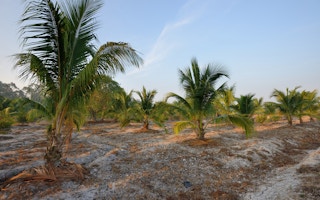A recent report by the Natural Capital Declaration (NCD) - a global initiative by financial institutions to integrate natural capital considerations into financial products - showed that these institutions still have a long way to go in effectively managing and reducing risks associated with companies in the soft commodities market.
Soft commodities are commodities which are grown such as livestock, palm oil and soy, as compared to commodities like metals and fossil fuels which are mined.
The report titled “Bank and Investor Risk Policies for Soft Commodities” was commissioned by the United Nations Environment Programme (UNEP) as part of the United Nations Programme on Reducing Emissions from Deforestation and Forest Degradation (UN-REDD) to provide greater clarity on policies which banks should adopt to curb unsustainable deforestation, especially in soft commodities markets.
Land-use conversion in the production of soft commodities is a major driver of deforestation and is responsible for 55 to 80 per cent of global forest loss in 2012 and 2013, according to the report.
Given that many financial institutions lend or invest in soft commodities, it is crucial that they understand the environmental risks and opportunities that could impact their portfolios from a sustainability and even financial perspective, the report stressed.
The report included a self-assessment tool – allowing banks and investors to identify and re-evaluate areas in their policies in which they can improve.
The tool, called the “Soft Commodities Forest-Risk Assessment Tool”, was developed by the NCD with Sustainalytics, an investment research firm specialising in environmental, social and governance (ESG) analysis.
Andrew Mitchell, co-director of NCD and CEO of Global Canopy Programme, said that this new tool gives banks and investors a way to develop soft commodity policies, using the criteria and recommendations in the report.
Disappointing report card for most banks
Despite the potential impacts, the report showed that most financial institutions do not have an in-depth appreciation for the risks associated with clients in the soft commodities market.
The report evaluated 30 international financial institutions, including HSBC Holdings, BNP Paribas and Rabobank Group, based on three factors: scope, strength and implementation of policies related to soft commodities dealings.
Although nearly 50 per cent did have generic policies addressing risks linked to investments in soft commodities, only a mere 13 per cent developed financial products and services targeted at the production and trade of sustainable commodities.
“
Banks and investors who engage in the destruction of forests through their lending and investment practices expose themselves to potentially significant regulatory, reputational, legal, operational and market risks, which could affect the credit risks and market value of underlying assets
Achim Steiner, UN Under-Secretary-General and UNEP executive director
One distressing finding was that 63 per cent of the financial institutions did not have policies which expressly required clients to comply with applicable environmental conservation laws and regulations.
Although the requirement for regulatory compliance may sometimes be contained within agreements, it is important that they are publicised, the report noted. This will push companies to comply, especially those in countries where regulatory enforcement is weak.
According to the report, Sumitomo Mitsui Trust Bank, Standard Chartered Bank and the African Development Bank, FMO Development Bank and the International Finance Corporation are amongst the best performers in managing soft commodities risks and opportunities.
Knock-on impacts of environmental risks
Environmental risks such as extreme weather patterns, scarcity of natural resources and tighter environmental conservation laws and regulations will affect companies in the soft commodities market whose activities are highly dependent on the ecosystem, according to the report.
This in turn has consequences on financial institutions who lend or invest in these companies.
The report explained that all aspects of a financial institution’s business – corporate lending, investment, advisory and insurance – may be affected by exposure to environmental risks. For example, such risks and unsustainable practices will affect the value of investments.
“Financial institutions have a major role to play in curbing deforestation and in helping to accelerate the transition to new more sustainable practices,” Mitchell said.
In particular, financial institutions need to pay special attention to dealings with agriculture and livestock companies in Southeast Asia as the region is one of the major producers of soft commodities in the world and has one of the largest continuous expanses of tropical forests globally.
“Addressing deforestation is high on the twenty-first century policy agenda”, said UN Under-Secretary-General and UNEP executive director Achim Steiner said in the report. “The continuing loss of the world’s tropical rainforests represents a significant threat to the security of water, food, energy, health and climate for millions worldwide.”
Taking the next steps
In its report, NCD also recommended “newcomers” to adopt minimum standards in order to establish a basic risk policy framework. These standards include disclosing a general sustainability policy or referencing sustainability certifications when reviewing the performance of its clients.
Institutions seeking to improve on existing procedures can adopt NCD’s best practices, such as requiring clients to commit to achieving certification under the Roundtable on Sustainable Palm Oil or other relevant commodity roundtables.
“Banks and investors who engage in the destruction of forests through their lending and investment practices expose themselves to potentially significant regulatory, reputational, legal, operational and market risks, which could affect the credit risks and market value of underlying assets,” said Steiner.
“Financial institutions can and should be part of the solution should they decide to adopt the tools and mechanisms designed to curb deforestation and produce sustainable value chains for commodities.”

















